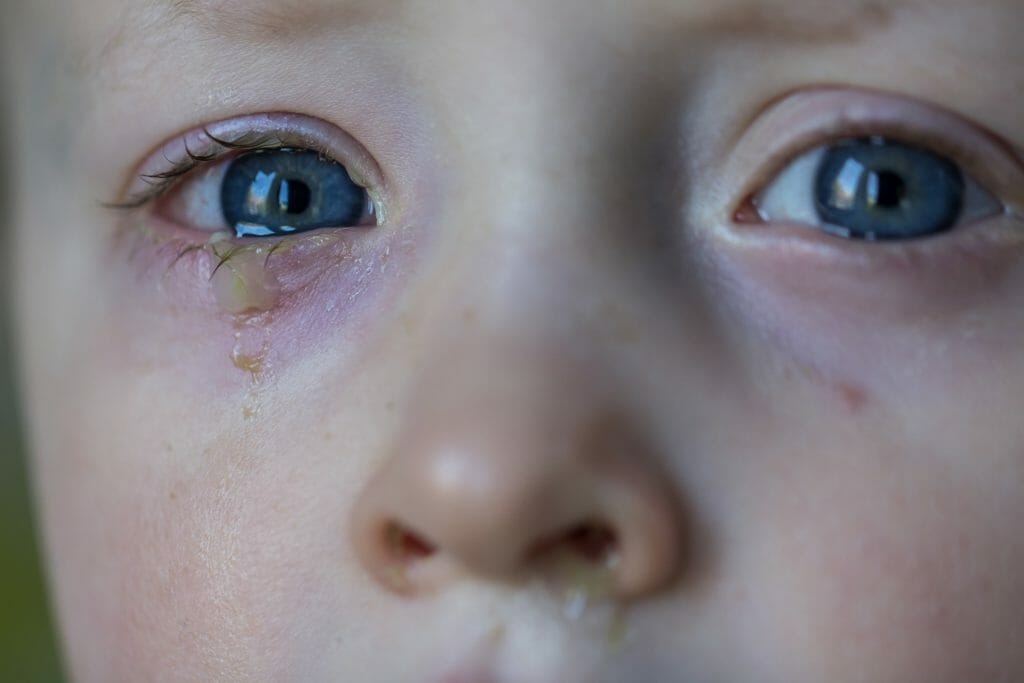Newborn Cold Eye Discharge - Baby cold and eye discharge are common conditions in infants, characterized by symptoms such as nasal congestion, coughing,. Sticky eye discharge in newborns is very common. Seeing unexpected discharge in your newborn’s eyes can be alarming, but in most cases it’s simply the result of a clogged tear. Newborn eye discharge that is yellow, thick and secreted in high quantities may be a sign of a cold, flu or conjunctivitis. Eye discharge in babies with cold is a common symptom that occurs when the tear ducts become blocked due to a viral or.
Baby cold and eye discharge are common conditions in infants, characterized by symptoms such as nasal congestion, coughing,. Seeing unexpected discharge in your newborn’s eyes can be alarming, but in most cases it’s simply the result of a clogged tear. Sticky eye discharge in newborns is very common. Eye discharge in babies with cold is a common symptom that occurs when the tear ducts become blocked due to a viral or. Newborn eye discharge that is yellow, thick and secreted in high quantities may be a sign of a cold, flu or conjunctivitis.
Seeing unexpected discharge in your newborn’s eyes can be alarming, but in most cases it’s simply the result of a clogged tear. Eye discharge in babies with cold is a common symptom that occurs when the tear ducts become blocked due to a viral or. Sticky eye discharge in newborns is very common. Newborn eye discharge that is yellow, thick and secreted in high quantities may be a sign of a cold, flu or conjunctivitis. Baby cold and eye discharge are common conditions in infants, characterized by symptoms such as nasal congestion, coughing,.
Newborn Eye Discharge Why Does This Happen? Clogged tear duct baby
Baby cold and eye discharge are common conditions in infants, characterized by symptoms such as nasal congestion, coughing,. Eye discharge in babies with cold is a common symptom that occurs when the tear ducts become blocked due to a viral or. Sticky eye discharge in newborns is very common. Newborn eye discharge that is yellow, thick and secreted in high.
Eye Discharge in Newborn Babies Causes and Treatment
Baby cold and eye discharge are common conditions in infants, characterized by symptoms such as nasal congestion, coughing,. Eye discharge in babies with cold is a common symptom that occurs when the tear ducts become blocked due to a viral or. Seeing unexpected discharge in your newborn’s eyes can be alarming, but in most cases it’s simply the result of.
When Should I Take My Baby to the Doctor for Eye Discharge? TheraLife
Seeing unexpected discharge in your newborn’s eyes can be alarming, but in most cases it’s simply the result of a clogged tear. Baby cold and eye discharge are common conditions in infants, characterized by symptoms such as nasal congestion, coughing,. Newborn eye discharge that is yellow, thick and secreted in high quantities may be a sign of a cold, flu.
Eye Discharge in Newborn Babies Causes and Treatment
Sticky eye discharge in newborns is very common. Newborn eye discharge that is yellow, thick and secreted in high quantities may be a sign of a cold, flu or conjunctivitis. Seeing unexpected discharge in your newborn’s eyes can be alarming, but in most cases it’s simply the result of a clogged tear. Eye discharge in babies with cold is a.
Newborn eye discharge Causes, treatments, and more
Baby cold and eye discharge are common conditions in infants, characterized by symptoms such as nasal congestion, coughing,. Sticky eye discharge in newborns is very common. Eye discharge in babies with cold is a common symptom that occurs when the tear ducts become blocked due to a viral or. Newborn eye discharge that is yellow, thick and secreted in high.
How I treat eye discharge of my baby??? YouTube
Sticky eye discharge in newborns is very common. Baby cold and eye discharge are common conditions in infants, characterized by symptoms such as nasal congestion, coughing,. Newborn eye discharge that is yellow, thick and secreted in high quantities may be a sign of a cold, flu or conjunctivitis. Eye discharge in babies with cold is a common symptom that occurs.
Newborn Eye Discharge Is It Normal And How To Treat It?
Eye discharge in babies with cold is a common symptom that occurs when the tear ducts become blocked due to a viral or. Newborn eye discharge that is yellow, thick and secreted in high quantities may be a sign of a cold, flu or conjunctivitis. Baby cold and eye discharge are common conditions in infants, characterized by symptoms such as.
Conjunctivitis
Eye discharge in babies with cold is a common symptom that occurs when the tear ducts become blocked due to a viral or. Seeing unexpected discharge in your newborn’s eyes can be alarming, but in most cases it’s simply the result of a clogged tear. Sticky eye discharge in newborns is very common. Baby cold and eye discharge are common.
2 Week Old Baby Eye Discharge
Newborn eye discharge that is yellow, thick and secreted in high quantities may be a sign of a cold, flu or conjunctivitis. Sticky eye discharge in newborns is very common. Baby cold and eye discharge are common conditions in infants, characterized by symptoms such as nasal congestion, coughing,. Eye discharge in babies with cold is a common symptom that occurs.
Eye Discharge on Newborns YouTube
Newborn eye discharge that is yellow, thick and secreted in high quantities may be a sign of a cold, flu or conjunctivitis. Sticky eye discharge in newborns is very common. Eye discharge in babies with cold is a common symptom that occurs when the tear ducts become blocked due to a viral or. Baby cold and eye discharge are common.
Sticky Eye Discharge In Newborns Is Very Common.
Eye discharge in babies with cold is a common symptom that occurs when the tear ducts become blocked due to a viral or. Seeing unexpected discharge in your newborn’s eyes can be alarming, but in most cases it’s simply the result of a clogged tear. Baby cold and eye discharge are common conditions in infants, characterized by symptoms such as nasal congestion, coughing,. Newborn eye discharge that is yellow, thick and secreted in high quantities may be a sign of a cold, flu or conjunctivitis.









